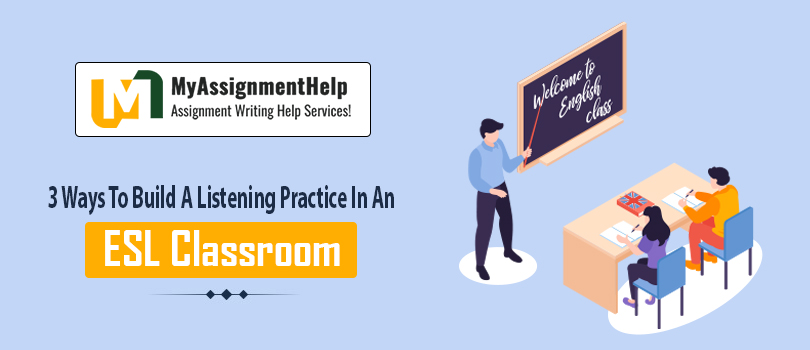Listening skills are fundamental for effective communication in any language, and this holds true for English as a Second Language (ESL) learners as well. To enhance their listening abilities, ESL teachers must implement engaging and interactive activities in the classroom. In this blog post, we will explore three effective ways to build a listening practice in an ESL classroom, with a focus on listening exercise assignment help, selective listening examples, and the role of platforms like BookMyEssay.

Listening Exercise Assignment Help:
Assigning listening exercises as homework or classwork can significantly benefit ESL learners in developing their listening skills. Teachers can select various audio resources, such as dialogues, interviews, podcasts, or TED Talks, to expose students to a range of accents, speeds, and topics.
To provide effective assignment help, teachers can:
- Provide Clear Instructions: Clearly outline the objectives of the listening exercise and guide students on what to focus on while listening. Encourage them to take notes and jot down unfamiliar vocabulary or phrases for discussion in the following class.
- Cater to Diverse Levels: Select listening materials that match the proficiency level of the students. It is crucial to offer challenges that are neither too easy nor too difficult, ensuring a balance between comprehension and stretching their skills.
- Offer Feedback and Discussion: Provide feedback on the assignments, highlighting areas of improvement and recognizing their achievements. Encourage students to discuss their experiences and difficulties, allowing them to learn from each other’s insights.
Selective Listening Examples:
selective listening example assignment help exercises can be an effective tool to train ESL students to focus on specific information while listening. This technique helps develop their ability to extract key details, identify main ideas, and infer meaning from context.
Here are some examples of selective listening exercises:
- Information Gap Activities: Divide students into pairs and provide each pair with different but related information. They must listen attentively to their partner and ask questions to fill in the missing details.
- Listening for Specific Vocabulary: Provide a list of vocabulary words related to the listening material. Students listen to the audio and mark the words they hear. Later, they discuss and compare their answers.
- Summarizing and Retelling: After listening to a passage, students summarize it in their own words or retell the story to a partner. This exercise encourages them to identify the main points and express them concisely.
Utilizing BookMyEssay and Online Platforms:
Online platforms like BookMyEssay can be valuable resources for ESL teachers and students alike. These platforms offer a wide range of listening materials, interactive exercises, and additional support for ESL learners.
- Access to Diverse Resources: BookMyEssay provides a vast collection of listening resources, including audio recordings, videos, and podcasts, covering various topics and difficulty levels. Teachers can utilize these resources to create engaging listening exercises.
- Customized Assistance: BookMyEssay offers assignment help services, allowing ESL students to seek guidance and support when working on listening assignments. Expert assistance can enhance their comprehension skills and boost confidence.
- Interactive Learning: Online platforms often provide interactive listening exercises, quizzes, and games that make the learning experience enjoyable and immersive for ESL students. This interactive approach fosters active engagement and improves listening abilities.
Conclusion:
Developing listening skills is essential for ESL students to become proficient English speakers. By incorporating listening exercise assignment help, selective listening examples, and leveraging online platforms like BookMyEssay, ESL teachers can create an engaging and effective listening practice in their classrooms. Regular practice, exposure to diverse listening materials, and targeted exercises will contribute to the overall improvement of students’ listening abilities, leading to enhanced communication skills in English.





